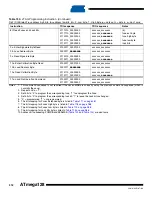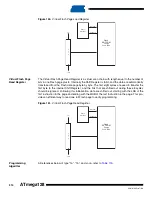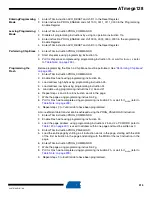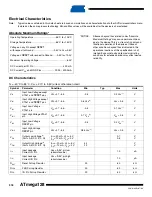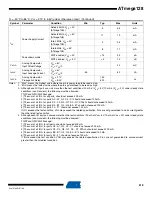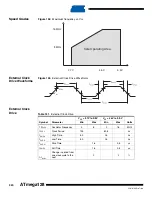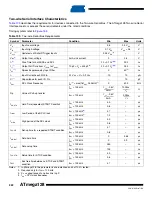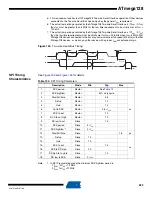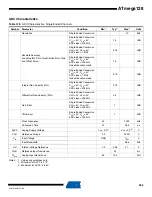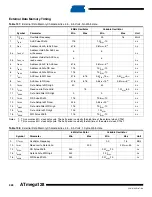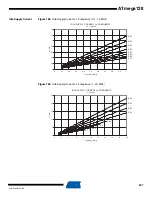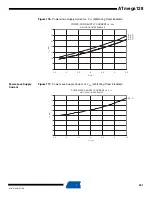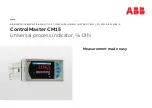
326
2467S–AVR–07/09
ATmega128
Table 136.
ADC Characteristics, Differential Channels
Symbol
Parameter
Condition
Min
Typ
Max
Units
Resolution
Gain = 1x
10
Bits
Gain = 10x
10
Bits
Gain = 200x
10
Bits
Absolute Accuracy
Gain = 1x
V
REF
= 4V, V
CC
= 5V
ADC clock = 50 - 200 kHz
17
LSB
Gain = 10x
V
REF
= 4V, V
CC
= 5V
ADC clock = 50 - 200 kHz
17
LSB
Gain = 200x
V
REF
= 4V, V
CC
= 5V
ADC clock = 50 - 200 kHz
7
LSB
Integral Non-Linearity (INL)
(Accuracy after Calibration for Offset and
Gain Error)
Gain = 1x
V
REF
= 4V, V
CC
= 5V
ADC clock = 50 - 200 kHz
1.5
LSB
Gain = 10x
V
REF
= 4V, V
CC
= 5V
ADC clock = 50 - 200 kHz
2
LSB
Gain = 200x
V
REF
= 4V, V
CC
= 5V
ADC clock = 50 - 200 kHz
5
LSB
Gain Error
Gain =
1x
1.5
%
Gain = 10x
1.5
%
Gain = 200x
0.5
%
Offset Error
Gain = 1x
V
REF
= 4V, V
CC
= 5V
ADC clock = 50 - 200 kHz
2
LSB
Gain = 10x
V
REF
= 4V, V
CC
= 5V
ADC clock = 50 - 200 kHz
3
LSB
Gain = 200x
V
REF
= 4V, V
CC
= 5V
ADC clock = 50 - 200 kHz
4
LSB
Clock Frequency
50
200
kHz
Conversion Time
65
260
µs
AVCC
Analog Supply Voltage
V
CC
- 0.3
V
CC
+ 0.3
V
V
REF
Reference Voltage
2.0
AVCC - 0.5
V
V
IN
Input Voltage
GND
V
CC
V
V
DIFF
Input Differential Voltage
-V
REF
/Gain
V
REF
/Gain
V
ADC Conversion Output
-511
511
LSB
Input Bandwidth
4
kHz

